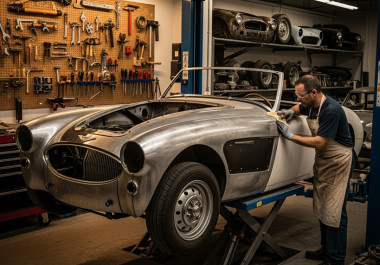Anyone who has spent time in the motor trade has seen the joy in the auction hall. But they’ve also seen the other side: the sheer panic in a bidder's eyes when they realise they’ve won a car they can't actually pay for. It’s a heart-sinking moment, and the consequences are far more serious than most people imagine.
A car auction isn't like filling an online shopping basket and changing your mind. When that hammer falls, it’s not just the end of the bidding. It’s the creation of a legally binding contract. To default on a car auction bid is to break that contract, and the fallout can range from losing your deposit to facing legal action for damages.
Before a hand is ever raised or a bid is clicked, it's crucial to understand what that commitment truly means.
A Bid Is a Promise: The Legal Reality
Here's where the confusion often lies. An auction is a formal process where every bid is a legal offer to buy. The auction house, like RAW2K, acts as an agent for the seller. When the auctioneer accepts the final bid, that offer is officially accepted, and a contract of sale is formed on the spot.
Think of it like signing a tenancy agreement. Nobody would sign it and then simply not move in without expecting the landlord to take action. Defaulting on a bid is the same principle. The seller and auction house have done their part by offering the car fairly. The responsibility to pay then falls squarely on the winning bidder.
The Immediate Fallout: What Happens in the First 48 Hours
So, the bid has been won, but the payment deadline—often just 24 to 48 hours—is looming, and the funds aren't there. What happens first?
1. The Deposit Is Gone
To participate in an auction, a bidder lodges a deposit or has a pre-authorisation hold placed on their card. This is typically a set amount, often between £250 and £500. The very first thing that happens is that this entire amount is forfeited. It’s not a fine; it’s compensation for the auction house’s time and the immediate costs incurred by the default. That money is gone for good.
2. The Unpleasant Phone Call
Next comes the call from the auction house. This won’t be a friendly chat. The representative will state clearly that the bidder is in breach of contract and that payment is required immediately. They will explain the impending consequences if payment is not made by the close of business.
3. The Seller Is Back to Square One
It’s easy to forget there’s another person in this equation: the seller. They may have been relying on that sale for their own financial plans. A default means their car must be re-listed, forcing them to go through the whole process again. This is a major reason why auction houses have no patience for defaults.
The Financial Domino Effect: It Gets Worse
Losing the deposit is just the start. The real financial pain can come later.
Liability for the Price Difference
This is the consequence that catches everyone out. Say a van is won at one of the vehicle auctions for £8,000. The bidder defaults. The auction house has to re-list it, but this time, the highest bid is only £7,000.
The auction house and the seller are now £1,000 out of pocket directly because of the default. They are well within their rights to pursue the original bidder for that £1,000 difference. On top of that, they can also add charges for:
-
Admin Fees: A fixed charge, often £100-£250, for the administrative work of re-listing the vehicle.
-
Storage Costs: For every day the car sits on their lot when it should have been collected, which can be £20 + VAT per day.
-
The Buyer's Premium: From the original sale that was defaulted on. On an £8,000 bid, a 10% premium would be £800 plus VAT.
Suddenly, a decision to back out can cost thousands, for a car the bidder doesn't even get.
A Cautionary Tale: The Bidder and the Bentley
There's a well-known tale in auction circles about a bidder who got caught up in a bidding war for a beautiful, classic Bentley. He won it for £40,000, to a round of applause.
The next day, he was a no-show. It turned out he’d been bidding with his heart, not his wallet. The auction house kept his £2,000 deposit, of course. The real sting came a month later when they re-auctioned the Bentley. The buzz was gone, and it sold for just £34,000. The auction house’s legal team sent a formal letter demanding the £6,000 difference plus their administrative and legal costs, which totalled another £1,500. It was a catastrophic and very public mistake.
The Long-Term Damage: Getting Blacklisted
What’s to stop a defaulter from just walking away and trying another auction? The auction community is smaller than many think.
Auction houses keep records of problem bidders. Anyone who defaults on a car auction bid will almost certainly be banned from ever bidding with them again. This ban extends to online platforms. A default with RAW2K, for example, would result in the account being suspended or permanently closed. This information is often shared among different auction groups, meaning a bad reputation can follow a bidder and effectively shut them out of the market.
Is There Any Way Out?
What about a genuine emergency? Life happens. A sudden crisis might make it impossible to complete a purchase. Is there any flexibility?
The honest answer is: very little. "Changing your mind" or "finding a cheaper one" will get a bidder nowhere. A genuine, provable emergency might earn some sympathy, but it will not erase the contractual obligation. At best, the auction house might waive some administrative fees, but the deposit will still be lost, and the bidder could still be liable for any shortfall if the vehicle is resold for less.
The only chance is immediate and honest communication. The second a problem arises, the bidder must get in touch with the auction house. Don't hide. Explain the situation clearly.
How to Avoid This Mess Entirely
The solution is simple: preparation. Never bid on a whim.
-
Set a Strict Budget: Know the absolute maximum, and remember to factor in all fees. For example, if your total budget is £5,000, and the buyer's premium is 10% + VAT, your maximum hammer price is actually closer to £4,400 to account for those fees.
-
Read the Terms: Every auction has terms and conditions. Read them. They contain the exact rules on payment, defaults, and fees. They can usually be found in the help section.
-
Inspect the Vehicle: Whether through the 20+ high-resolution photos and detailed descriptions for online car auctions or a physical viewing, know what is being bid on.
-
Have Finances Ready: Do not bid unless the money is in an account, ready to go. A pending loan application is not "ready."
A bid is a serious commitment. Treat it as such, and auctions are a fantastic way to buy a vehicle. Disrespect the process, and you’ll discover the hard way how binding a contract can be.




